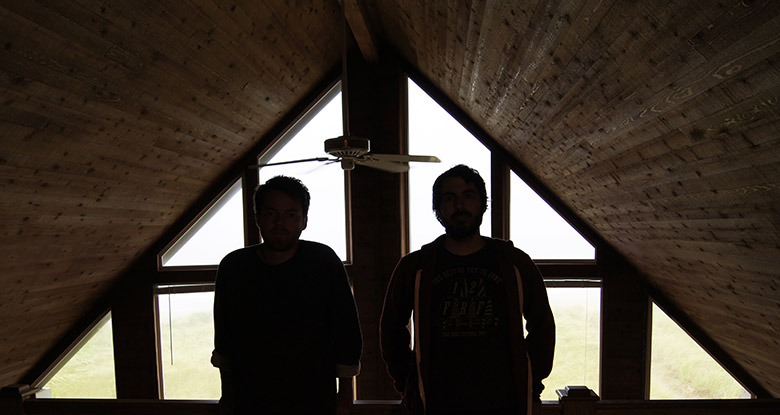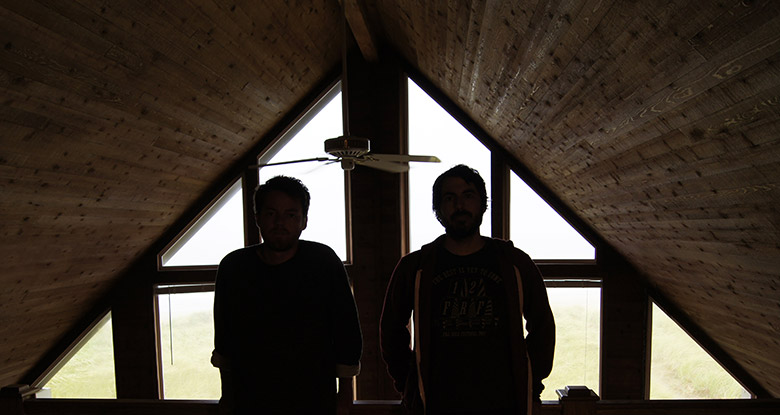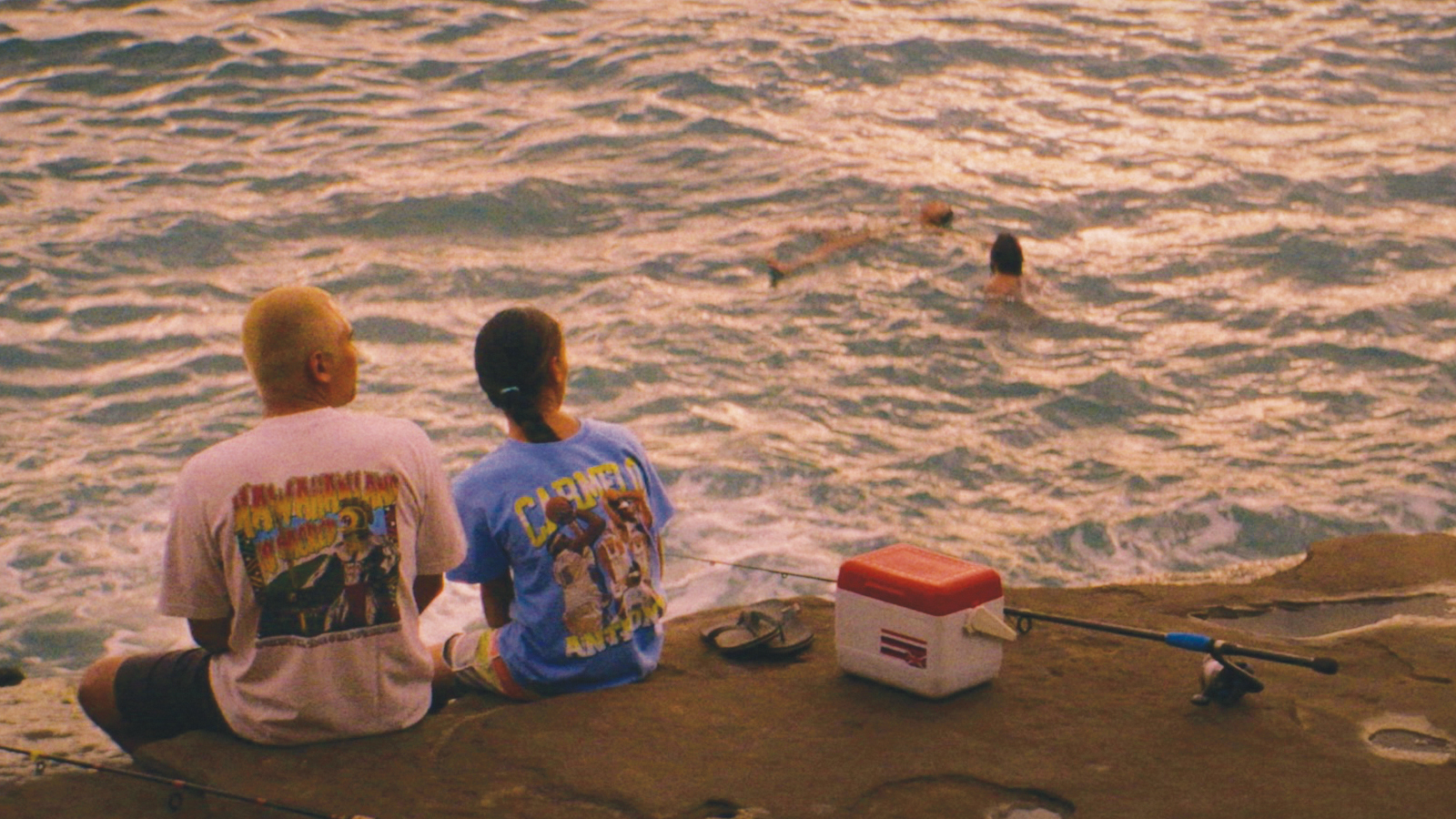
Invigorated by a vibe of spontaneity, Inventions unveils subtle surprises over time. Floating and fluttering amid the vapor trails of keyboard and guitar are intriguing sounds and tics not tethered to either Cooper or Smith’s main projects. Unique to the album as well are the dominant beats on “Peaceable Child” and “Recipient”, neither resembling the cacophonous live drumming of Explosions nor the pulse-tapping undercurrent of Eluvium. Where both of those bands’ work can often present like complete statements, Inventions also sets itself apart in how open-ended it feels; a breathing, growing, glowing thing. A natural thing. So natural feeling, in fact, that it’s almost surprising how long it took Cooper and Smith to decide to work together…


Though you’ve toured together and shared a record label for years, your first collaboration was not too long ago, on “Envenom Mettle” from Nightmare Ending. Following that, how was Inventions initiated? Did one of you make that first call, or was it more gradual?
Maybe… both? It was not really spontaneous, as we had talked loosely about collaborating for a while — and certainly after we did “Envenom Mettle,” there was a lot more talk. We’ve been great friends for years and emailed all the time anyway, so in that sense, there was a gradual growing towards it. But then there was a certain point at which we decided life is short and we should just go for it. “Punctuated equilibrium” is probably the best term for our evolution.
In terms of creative approach, what did you take away from that first collaboration, and how did you apply it to this current project?
I think it is hard to compare the two, as “Envenom Mettle” is ultimately an Eluvium track, and was thus designed and edited and shaped by me, specifically for Nightmare Ending. Though one thing that I think of, perhaps, is the relative ease in which it all took place, as well as the surprise of hearing Mark doing things that I didn’t expect from him. It was quite invigorating for me. So, although maybe nothing specifically carried over into Inventions, as far as I can tell, it nonetheless certainly created an awareness of the joys of working with each other, and the ease and playfulness that could occur when doing so.
Was there much in the way of discussions about what the music would sound like, or what shape the final results might take?
Yes, there was a period of ambitious statements and goals. We wanted to do stuff that we didn’t really know how to do. We wanted to make something unique–not like the expected amalgam but some sort of “other” hybrid or mutation. So after a couple weeks of grand statements, we never really talked anymore about what things “should” sound like, because music was now taking shape and it very naturally took its own idiosyncratic shape, despite whatever intentions we might have had. Things always seemed to take unexpected turns, and very much in that good kind of way, the positive and surprising way. Music is best for me when I don’t set out on a planned path, but when I just allow myself to be drawn in multiple directions and ultimately find the one that feels best.
As you began to work together, were there aspects of one person’s working habits that the other had make an effort to adapt to?
We were emailing so much, I think I began to get an understanding of Mark’s daily schedules, [including] when to expect responses from him on things I had sent, and also when to expect that I might get a treat of an email with some weird sounds attached. I don’t recall ever needing to adapt to anything, though. The interesting thing about working together to me was how easily and swiftly it all came together. It honestly just flowed back and forth and before we knew it, we had an album. There was probably a build up of the excitement of working together and trying new things and allowing each other this room to go wherever we wanted, that it just blossomed forth and mutated in its own unfettered evolution.
It’s nice waking up in the morning to a bunch of emails with sounds/songs/sketches attached to them. I sip my coffee and listen and get inspired to make things to return to him.
Mark Smith:
Mostly just time zone, which I can’t really hold against him, I suppose. (Matthew’s in Portland and I’m in Austin.) I like to work in the early mornings when my kids are at school, and I always know he won’t really be around for the first few hours. But other than that, which is basically no issue at all, there hasn’t been anything. I’m pretty much continually impressed by his dedication and how much and how fast he works.
Was there any conscious decisions made, on either of your guys’ part, about what elements of your main projects you would bring to Inventions, and/or which you would leave out?
Yeah. It’s tricky. Musicians develop some singular characteristics as they keep making music over the course of many years. It’s your way of expression, and for better or worse, it defines you. For me, it’s been the use of the electric guitar usually along with reverb and delay, usually in the form of expressive melodic lines. I’m happy about what I’ve done, and people have responded very favorably over the years to what I’ve done as part of Explosions, but if you don’t move on and develop, then the defining characteristics can feel a little bit like a restriction. I don’t think any artist wants to stagnate or repeat themselves, but at the same time you played things that way because you loved it and it expressed something. So for Inventions, I wanted to experiment with a lot of stuff — bring in musical samples, vocal samples, try playing keyboards, use electronics, call into question what constitutes a song, etc. But on the other hand, I also love the guitar. So instead of making the guitar the main thing, or leaving it out completely, I wanted to supplement the new ideas with my guitar, or vice versa. And I don’t want to speak for Matthew, but I think he went through much the same process when it came to how he approached things.
Absolutely.
Along those lines, how much did you see Inventions as an opportunity to try new things that were perhaps outside of the established sounds of your main bands/projects? How experimental did it get for you?
I think Inventions is definitely an opportunity to try new things that we maybe wouldn’t normally put into our other bands. But I also think this first album was more about the act of coming together in the first place, and testing those waters. It may not be as audible on this record, compared to the methodology that went into it, but I think it has certainly created a new breeding ground, so to speak, for experimentation and searching for unique or contrasting emotions and structures and compositional reasoning, as well as a playfulness within the technique. Not to suggest the playfulness overrides the message and emotional content, as those are things that are very important to us as well. But we hope that the music can hit on multiple levels, both when listening and creating. I think Mark once mentioned it was about the searching. I concur.
There’s been a sense of trying anything and everything we can think of. I’ve been having a lot of fun trying out things on the computer — warping and manipulating and looping and fading until I find them pleasing, plugging in the keyboard and trying out different sounds, and then trying all manner of things on the guitar, bowing it or e-bowing it or using a slide or a coin. It helps banish writer’s block, because you can always find some way of making something sound cool, and even if it’s not right for the song you’re currently working on; then you can save it and it might work for some other song in the future, or you can make it into its own thing.
Do you think that this collaboration will have an effect on how you approach the music you make with Eluvium and EITS? Are there elements of Inventions you can see taking back to your respective day jobs?
Matthew Cooper:
The Eluvium album I’m currently working on would not have the opportunity to feel the effects, due to many factors. But when I think ahead onto later Eluvium albums that are waiting in the wings, there is certainly a curiosity arising as to what ideas might bleed over. If nothing else, every album you work on will hopefully be an education that can lend itself to later projects.
Good question, and to be determined. Explosions has started working on new music, and even though we’re very early in the process, it’s feeling fresh and great. It’s just all about the creation, and what you learn from it, and the growing from it — I think that what I do in Explosions can inform what I do in Inventions, and so on, and vice versa, in some sort of feedback loop.
What shared influences, musical or otherwise, do you have that played a part in shaping the album?
Just thinking back over the songs that we’ve done so far, we’ve referenced to each other Aphex Twin, Boards of Canada, Burial, Silver Jews, Pavement, Panda Bear, John Cage, Bedhead, many others. Along with just the influences of taking enormous comfort from music, both listening and playing, and always wanting to reflect feelings of love for nature or love for family or friends or feelings of adriftness or imbalance or smallness or wonder or hypnotism or all the other things that make us want to create art.
The album was finished (or at least partially made?) in a beach house on the Oregon Coast. How did that come about? How did that physical setting affect the whole process?
It just made sense to get together in person to make some final decisions with mixing and adding or adapting things. It feels good to see my friend in person, and to share the full experience of what we are doing together. The coast seemed like the right spot for it. We were able to get a house right on the beach with awe-inspiring views.
When you get into the final mixing process, it can be quite taxing on your brain and ears and well-being. You are listening so intently, and focusing so much on a singular thing. Having that open, gushing, scene of the Pacific Ocean and beach grass and wind and water and fog and flow and just natural beauty surrounding you really is a great way to decompress quickly or to never really get overly saturated by your focus on the music in the first place. We worked very long days out there, and having that space right outside, to see or to step out and succumb to, was helpful and inspiring for our mental abilities and stamina. It is also just an awesome place to listen to music. Walking down the beach with headphones on, sometimes totally alone, and sometimes kids and dogs running and playing… It is a beautiful thing.
We weren’t 100% sure it would be necessary or worth it to get together in real life, as it would cost a lot of money to fly and rent a house and rent some gear, plus we basically had the album almost completely written by the time we went out there. But it was 110% worth it. Not only did the album immeasurably benefit from us being able to fine-tune the mix and even develop some new parts, but it also completely solidified the idea of the band. It (we) felt real. And the setting just made it that much better — there was a good feeling of harmony there.
Did collaborating “in real time” physically in the same room, as opposed to back and forth across the Internet more on your own time, change the way you worked together at all?
There was probably more laughter, smirks, and hilarity ensuing. I think it was also enjoyable to see each other’s reactions in real time; when an idea was presented or a change made, you sometimes get an awkward face pinching, or an open eyed stillness or a mouth agape. It’s enjoyable to feed off of those things, and to react to the reaction.
Is there a possibility for any live shows together, or will this remain a recording project for now?
It will be a little while, as we are trying to get a few new things together, and obviously we both want to continue creating for Eluvium and Explosions, but we are indeed heading towards live shows. It feels like a natural step forward to want to find interesting and enjoyable ways of presenting the music. Maintaining that level of searching and expansion that we hold dear.
Ω






